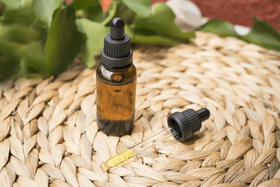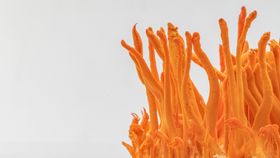3 Natural Mood Stabilizers for Perimenopause: CBD, Mushrooms, & Ginseng
Perimenopause comes with lots of symptoms. One of the most troublesome is mood swings. A variety of natural substances have been used to help stabilize mood. These are three of the best: CBD, mushrooms and ginseng. It is important to choose the right combination of natural substances and medications so that life can go on as normal. Many of the symptoms cause havoc and last for a long time.
Updated April 14, 2023.

Perimenopause comes with many symptoms, one of which is unexpected mood swings. Hormone replacement therapy is the standard treatment for menopause, but there are few things that help with perimenopause, the period before menopause.
Perimenopause can start as early as age 35 and end much later when menopause begins at the average age of 52. Perimenopause is often when periods become more erratic, and menopausal symptoms can continue from four to ten years.
Why You Might Experience Mood Changes in Perimenopause
Mood changes happen in perimenopause as your hormone balance is upset, particularly from a decrease in estrogen. However, physical discomfort and adverse reactions to medication can also lead to sour moods.
Dealing with the symptoms of perimenopause can be difficult, especially due to the lack of medication. However, there are several natural remedies that may offer some relief with a low risk of side effects and without addiction. Keep reading to discover the best ones.
1. CBD Oil
CBD may assist with the management of the endocannabinoid system, which regulates many of the body's functions and has receptors throughout the peripheral and central nervous systems. Anandamide is the molecule responsible for regulating mood and serotonin uptake, which may be boosted by CBD (1). This works for perimenopause because there is a close relationship between estrogen and the endocannabinoid system (2).
CBD is also potentially linked with lowering anxiety and stress, two potential symptom of perimenopause (3).
» Need a mood boost? Take a look at our Uplift Drops and Boost Drops
Additionally, CBD oil also appears to have sleep-improving qualities that can help counteract the negative impact of perimenopause on sleep. See our range of sleep support products to learn more.
2. Functional Mushrooms
Mycotherapy, the study of the use of extracts and compounds obtained from mushrooms as medicines or health-promoting agents (4), plays a key role in traditional Chinese medicine to help in the perimenopause-menopause transition. They are adaptogenic, which means that they are an all-natural way to help the body to adapt to stress. Some of these mushrooms may help with specific issues relating to menopause due to their modulating properties, which may help balance hormones like estrogen similarly to traditional hormone replacement therapies (5).
Functional mushrooms may also reduce fatigue and increase libido, both common perimenopausal symptoms.
These specific mushrooms can be useful in perimenopause:
1. Reishi
Reishi is known for hormone balancing and for being a natural mood stabilizer. It may also decrease inflammation linked to many perimenopausal symptoms.
» Learn more: Health Benefits and Side Effects of Reishi Mushrooms
2. Cordyceps
There is research to support Cordyceps having a beneficial impact on irritability because of low estrogen as well as other symptoms of estrogen deficiency, such as osteoporosis (6).
Cordyceps also contains a substance that causes vasodilation and, therefore, increases blood flow, which can help with fatigue and libido. It also acts to stimulate and support the estrogen pathway (and stimulates the release of estrogen).
» Learn more: Cordyceps Militaris: Risk Factors & Potential Side Effects
3. Maitake
Perimenopause can mark the beginning of a decline in insulin sensitivity, the body's ability to grab and use circulating glucose, leading to insulin resistance and promoting weight gain, poor blood sugar control, and potentially type 2 diabetes in severe cases. Maitake has been shown to boost insulin sensitivity and assist with blood glucose levels (7).
Mood swings are also impacted by Maitake as it promotes balance in insulin and blood sugar.
» Learn more: Health Benefits of Maitake Mushrooms
3. Ginseng
Ginseng is often associated with men's health and particularly libido. However, ginseng has long been used as a root to help women by increasing energy, balancing emotions, and impacting hot flashes. There has been significant scientific research highlighting the potential positive effects for perimenopausal, menopausal, and post-menopausal women (8)(9).
Research differs as to the type of ginseng that is best for perimenopausal symptoms, though most of it has been on red ginseng and, significantly, Korean red ginseng.
Ginseng can be prepared in many ways: supplements, raw teas (slice the root and boil it into a tea), pre-prepared teas, tinctures, and powdered ginseng that can be added to drinks or food. A simple tea made by boiling the roots is the most popular way of using ginseng in the modern world.
» Need a mood boost? Take a look at our Uplift Drops and Boost Drops
Combine Remedies for Maximum Effect
There are many great natural remedies that may offer you some relief from perimenopausal symptoms, but you need not be limited to one. In fact, combining the benefits of multiple may be a great choice with a limited risk of side effects. Read our M2CBD formula for more info.
It is essential to remember that there can be interactions between different types of supplements and also between supplements and medications, so care should be taken when starting any new regimen. Talk to your doctor if you have any concerns.







